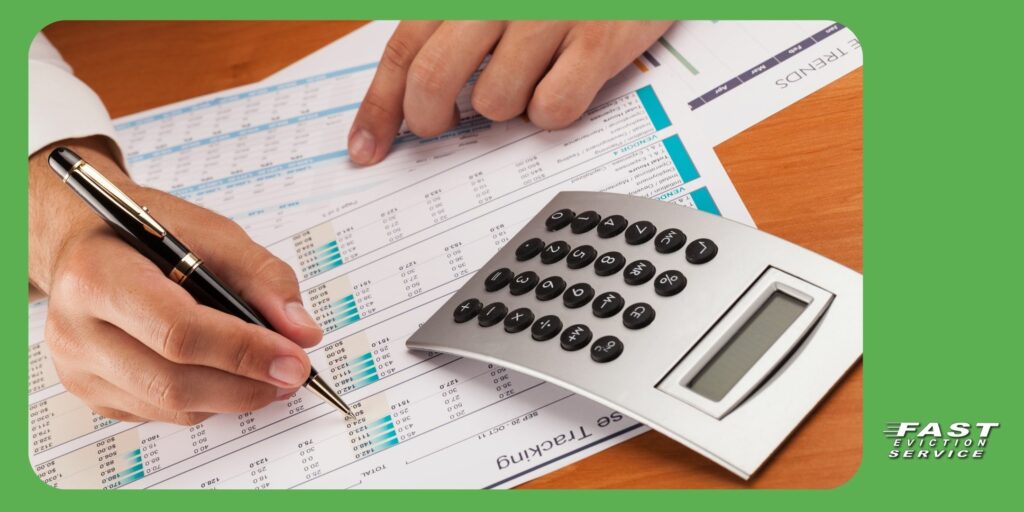Updated 01/21/25
Managing rental properties comes with its fair share of responsibilities, and keeping track of tenant payments is one of the most critical tasks. A rent ledger is a powerful tool that allows landlords to track rental income, monitor payment history, and maintain accurate records for each tenant. Whether you manage a single property or multiple units, a rent ledger can streamline your financial processes and ensure your books are in order.

In this guide, we’ll explore what a rent ledger is, its benefits for landlords, and how to create and use one effectively. By the end, you’ll have a clear understanding of why incorporating a rent ledger into your property management routine is a smart move.
Table of Contents
- What Is a Rent Ledger?
- Key Information Included in a Rent Ledger
- How to Create a Rent Ledger: Step-by-Step Guide
- Manual vs. Automated Rent Ledgers: Pros and Cons
- Benefits of Using a Rent Ledger for Landlords
- How to Use a Rent Ledger for Eviction Proceedings
- Rent Ledger vs. Rent Roll: Understanding the Differences
- How Rent Ledgers Can Simplify Tax Reporting
- Why Automated Rent Tracking Is the Future of Property Management
What Is a Rent Ledger?
A rent ledger is a detailed financial record that tracks rent payments from tenants over time. It’s essentially a tenant’s payment history, showing when payments were made, how much was paid, and any outstanding balances. Landlords use rent ledgers to ensure accurate bookkeeping, resolve payment disputes, and provide documentation during legal proceedings if necessary.
Unlike a rent roll, which summarizes rental income for an entire property or portfolio, a rent ledger focuses on individual tenants. This distinction makes it an invaluable tool for landlords who need a detailed view of payment activity for each unit.
Key Information Included in a Rent Ledger
A comprehensive rent ledger should include the following details:
- Tenant Information: Name, unit number, and lease term.
- Payment Dates: The exact dates rent payments were received.
- Payment Amounts: The amount paid, including any partial payments.
- Outstanding Balances: Any unpaid rent or late fees.
- Notes: Additional remarks, such as reasons for late payments or agreements on payment plans.
This information ensures that landlords have a complete and accurate record of rental income, which can be invaluable for both day-to-day operations and long-term financial planning.
How to Create a Rent Ledger: Step-by-Step Guide
Creating a rent ledger doesn’t have to be complicated. Follow these steps to set up a simple yet effective ledger:
- Choose a Format: Decide whether to use a spreadsheet, a paper ledger, or automated software like Landlord Studio.
- Input Tenant Details: Add tenant names, unit numbers, and lease start and end dates.
- Set Up Columns: Include columns for payment dates, amounts, outstanding balances, and notes.
- Record Payments: Log each payment as it comes in, ensuring accuracy and consistency.
- Update Regularly: Keep the ledger updated to reflect the latest payment activity.
Using rent ledger templates for landlords can simplify this process and ensure you don’t miss any critical details.
Manual vs. Automated Rent Ledgers: Pros and Cons
Manual Rent Ledgers: These are often created using spreadsheets or physical ledgers. While they offer flexibility and low costs, they require more time and are prone to errors if not updated diligently.
Automated Rent Ledgers: Software solutions like Landlord Studio provide automated rent tracking, reminders, and reporting features. These tools save time, reduce errors, and often integrate with other property management tools for seamless operations.
For landlords managing multiple properties, automated rent ledger software is a worthwhile investment that simplifies financial tracking and reporting.
Benefits of Using a Rent Ledger for Landlords
The benefits of using a rent ledger extend far beyond tracking tenant payments. These include:
- Transparency: A clear record of payments fosters trust between landlords and tenants.
- Efficiency: Simplifies financial tracking, saving time for landlords.
- Dispute Resolution: Provides concrete evidence in case of payment disputes.
- Legal Compliance: Serves as crucial documentation during eviction proceedings or audits.
By leveraging a rent ledger, landlords can streamline their property management processes and avoid common pitfalls.
How to Use a Rent Ledger for Eviction Proceedings
In eviction cases, a rent ledger can serve as critical evidence to support your claims. Courts often require detailed records of missed payments, late fees, and payment attempts. A well-maintained rent ledger:
- Demonstrates professionalism and organization.
- Provides clear proof of tenant defaults.
- Helps landlords comply with local eviction laws.
Using a rent ledger for eviction cases ensures you’re prepared if legal action becomes necessary.
Rent Ledger vs. Rent Roll: Understanding the Differences
While both rent ledgers and rent rolls are financial tools for landlords, they serve different purposes. A rent ledger focuses on individual tenant payment histories, making it ideal for tracking specific accounts. In contrast, a rent roll summarizes rental income for an entire property or portfolio, offering a high-level view of financial performance.
Understanding these differences ensures landlords use the right tool for their needs, whether it’s tracking tenant payments or evaluating overall property profitability.
How Rent Ledgers Can Simplify Tax Reporting
Tax season can be stressful for landlords, but a well-maintained rent ledger simplifies the process. By providing a clear record of rental income and outstanding balances, a rent ledger makes it easier to:
- Report accurate income to tax authorities.
- Deduct allowable expenses.
- Prepare for audits with organized documentation.
Using a rent ledger for tax season not only saves time but also reduces the risk of errors and penalties.
Why Automated Rent Tracking Is the Future of Property Management
As property management becomes increasingly digital, automated rent tracking is becoming the standard. Tools like Landlord Studio offer features such as:
- Automatic payment reminders for tenants.
- Real-time updates on rent payments.
- Integration with accounting software.
These tools enhance efficiency and accuracy, allowing landlords to focus on growing their portfolios rather than managing tedious paperwork.
Frequently Asked Questions About Rent Ledgers
What is a rent ledger? A rent ledger is a financial record that tracks tenant payments, including dates, amounts, and outstanding balances.
What are the benefits of using a rent ledger? Benefits include improved transparency, efficient financial tracking, and valuable documentation for disputes and tax reporting.
How do I create a rent ledger? You can create one manually using a spreadsheet or use automated software like Landlord Studio for a more streamlined process.
What is the difference between a rent ledger and a rent roll? A rent ledger focuses on individual tenant payments, while a rent roll provides a summary of rental income for an entire property.
Can a rent ledger be used in eviction proceedings? Yes, a rent ledger serves as critical evidence in legal cases, demonstrating payment history and outstanding balances.
Maintaining an accurate rent ledger is essential for effective property management. By understanding its importance and using the right tools, landlords can simplify their operations, improve tenant relations, and ensure financial success.




